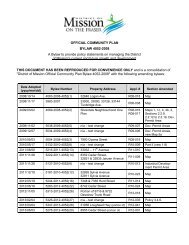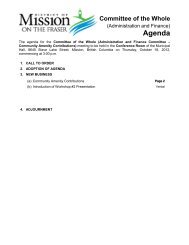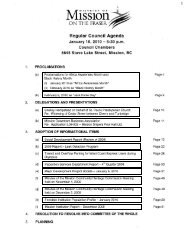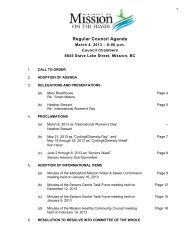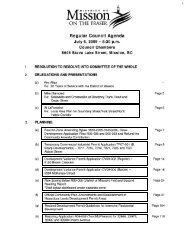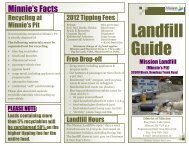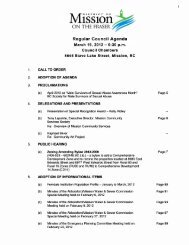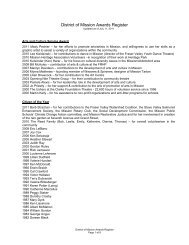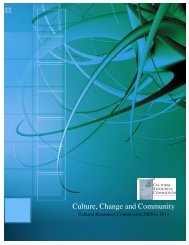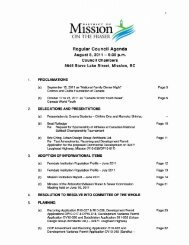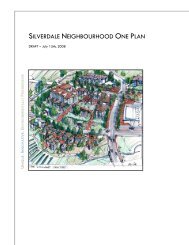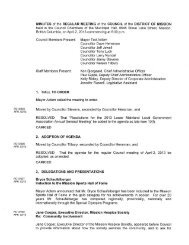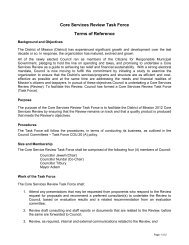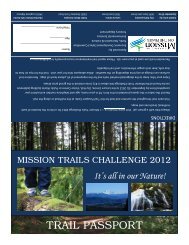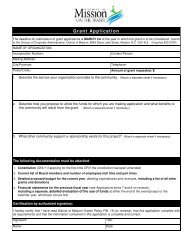June 15, 2009 - District of Mission
June 15, 2009 - District of Mission
June 15, 2009 - District of Mission
You also want an ePaper? Increase the reach of your titles
YUMPU automatically turns print PDFs into web optimized ePapers that Google loves.
54<br />
2. A visit with staff to existing facilities (including those identified by the Cultural Resources<br />
Commission).<br />
3. Discussions with stakeholders involved with culture, seniors and youth. It is suggested that<br />
meetings be arranged with key organizations to discuss each group's current activities and<br />
needs, as well as the suitability, size, condition, location, and accessibility <strong>of</strong> facilities, their<br />
ownership, and any issues related to each.<br />
It is estimated that approximately 25 groups will be contacted, and that some meetings could<br />
involve more than one organization. As a result, a total <strong>of</strong> 10 -12 meetings are anticipated. The<br />
consultants will facilitate each meeting; however, staff assistance in making logistical arrangements<br />
would be necessary.<br />
4. Contact will be made with other communities to discuss current trends and best practices in the<br />
provision <strong>of</strong> facilities and programs in the area <strong>of</strong> culture, seniors and youth; and to discuss other<br />
communities' efforts related to strategies, goals and principles related to culture, seniors and youth.<br />
Staff and the consultants will identify up to five communities and develop a questionnaire that can<br />
be used to gather and summarize the information collected.<br />
5. The information gathered from Steps # 3 and # 4 will be prepared for discussion with <strong>District</strong> <strong>of</strong><br />
<strong>Mission</strong> <strong>of</strong>ficials in order to review the findings and determine whether or not additional research is<br />
necessary.<br />
6. The consultants will prepare a Draft Report, including a list <strong>of</strong> facilities that will address cultural<br />
interests, senior and youth, discuss the Draft with the client, and make necessary revisions. The<br />
report would include an evaluation related to whether or not existing facilities can meet current and<br />
future needs.<br />
7. Following a review with Council, the report will be amended as required, and presented to Council<br />
and the Cultural Resources Commission as the Final Report.<br />
Principles<br />
1. The consultants will review existing <strong>District</strong> policy documents relating to the provision <strong>of</strong> parks,<br />
recreation, and cultural infrastructure, including but not restricted to the <strong>District</strong>'s Cultural Master<br />
Plan, its Parks and Recreation Master Plan, and its Cultural Policy; as well as any policy<br />
documents relating to the <strong>District</strong>'s overall Vision, <strong>Mission</strong>, Values, and Goals.<br />
2. The consultants will facilitate a workshop with Council, the Cultural Commission and senior staff to<br />
gain insights into Council's Values, as they relate to the provision <strong>of</strong> infrastructure for culture,<br />
seniors, and youth.<br />
3. The consultants will then review input received from other jurisdictions (as per # 4 above), the<br />
results <strong>of</strong> the community consultation, and the results <strong>of</strong> the Council workshop to develop a draft<br />
set <strong>of</strong> principles for the provision <strong>of</strong> infrastructure for culture, seniors, and youth.<br />
4. The draft principles will be reviewed with staff and incorporated in a Draft Report, which will then be<br />
presented to Council.



